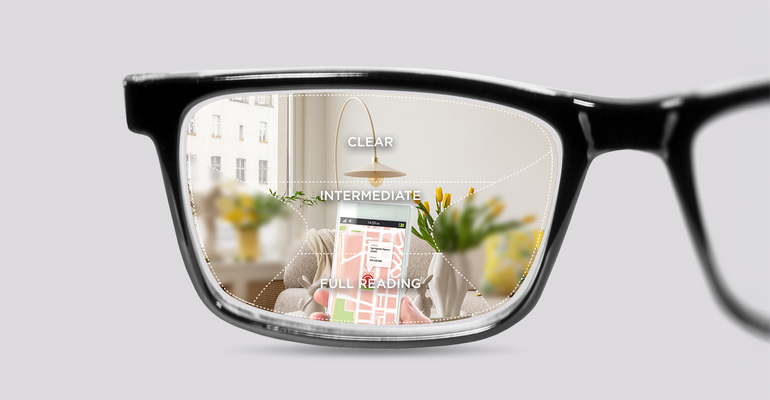Intermediate Glasses: What They Are and Who Needs Them
Dec 26, 2024

It’s estimated about 63.7% of the US population needs glasses according to the Vision Council.
Intermediate glasses are gaining more popularity globally due to the increasing time we spend looking at our screens. This is especially true for those of us in office jobs where we spend the majority of our day looking at computer screens or reading things from our desks.
In our guide below, we’ll discuss what intermediate glasses are and who needs them.
What Are Intermediate Glasses?
Intermediate glasses are one of the most common types of glasses. They are designed for mid-range vision which is typically at a distance between 20 inches to 5 feet (50 cm to 1.5 meters).
This range covers the most typical distance that people interact with their computers, smartphones, and tablets or when they engage in tasks like reading from a desk, cooking, or making crafts.
These glasses are also useful for people with presbyopia, a condition that affects people as they age. This can cause difficulty when focusing on near objects.
It’s important to note that intermediate glasses are not the same as reading glasses and have half the amount of power.
Progressive lenses and bifocals are also types of glasses that can correct presbyopia.
Intermediate glasses are more of a specialized option designed to suit people who spend time in the middle-range visual zone.

Intermediate Glasses Vs Other Types Of Eyewear
Reading Glasses
These are designed for close-up tasks like reading or looking at your phone. They provide magnification for near vision but don’t work well for intermediate distances.
To see if you need reading glasses check our guide here.
Single Vision Glasses
These glasses are designed to correct vision at specific distances, either near or far. They do not correct middle-range vision.
Progressive Lenses
Progressive lenses offer a seamless transition between near, intermediate and far vision, unlike trifocals with visible lines.
Progressive lenses aren’t the best choice to correct intermediate vision since they don’t provide the clarity for tasks that need consistent mid-range focus.
Bifocals
These glasses have two distinct lens powers, one for near vision and one for distance.
However, the transition between them is quite jarring with no specific zone dedicated to intermediate vision. They differ from reading glasses since they also correct distance vision.

Who Needs Intermediate Glasses?
People get intermediate glasses for a variety of needs, the most common reasons are -
People With Presbyopia
As we age the lens in our eyes will lose flexibility naturally which can make it difficult to focus on nearby objects. This condition is known as presbyopia which starts to affect people around the age of 40.
Intermediate glasses will help address the everyday challenges of focusing on things like a computer screen or reading from a desk.
Office Workers and Digital Professionals
People who work in front of computers for extended periods tend to be prone to digital eye strain. Intermediate glasses help reduce eye strain since they assist with focusing on nearby objects.
Hobbyists and DIY Enthusiasts
If you engage in activities like sewing, painting, knitting, cooking or even woodworking, intermediate glasses can assist with clarity, allowing you to see intricate details without straining or adjusting your position.
Individuals With Astigmatism or Specific Vision Needs
People with astigmatism, nearsightedness (myopia) or farsightedness (hyperopia) can find it difficult to focus at intermediate distances, even with standard glasses.
Intermediate glasses are a great solution since they are specifically designed to improve visual clarity in this range.

How To Choose the Right Intermediate Glasses
If you are shopping for a pair of intermediate glasses, you want to take into account the following factors -
Get An Accurate Prescription
The first thing to do if you're experiencing vision problems when looking at your laptop is to get an eye test, after this, they will give you a prescription. You can learn how to read a prescription here.
Frame Style and Comfort
Choose a frame style that is comfortable and suits you. Frames made with lightweight materials are best for all-day wear such as TR90, acetate and metal.
If you're not sure what type of glasses will suit you best you can use our face shape detector.
Lens Type and Coatings
GlassesShop offers many lens options such as prescription, blue block, transitions, mirrored, polarized and more. Coatings include anti-scratch, anti-reflective, UV protective coating and superhydrophobic coating.
If you're not sure which type of glasses you want you can use our free home try-on service.
Consider Your Lifestyle Needs
If you're someone who works at a computer all day look for lenses that specifically address digital eye strain. If you are someone who needs glasses for a mix of work and recreational activities then choose frames that offer versatility and durability.
Find Your Perfect Intermediate Glasses With GlassesShop
At GlassesShop we have a large range of intermediate glasses to choose from and have lots of deals and discounts so you can get the most for your money. From clearance sales to the first pair free, coupon codes, glasses under $20 and more.
We also give a 365-day guarantee with all our glasses for buyer's confidence and have free shipping over $69.